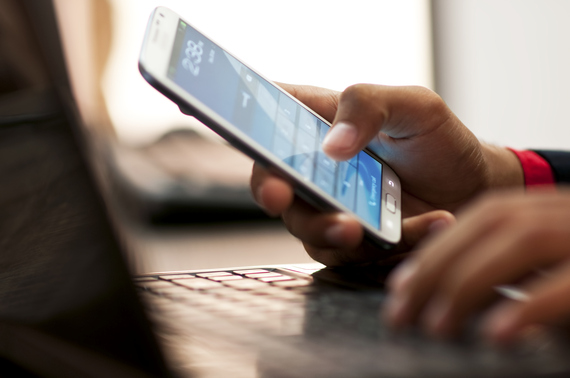
By John Swartzberg, M.D.
Did you make any New Year's resolutions? Perhaps you resolved to get serious about exercising, or cut down on sugar, or quit smoking. Or maybe you decided to cut down on something else: time connected to your digital devices. More and more people's lists of good intentions for the coming year include a pledge to shut off the phone and live more in the moment.
I've even seen some articles that suggest that sticking to some sort of "digital diet" can be good for your health--but that's not a train of thought I can jump on yet. I absolutely think that disconnecting from our perpetual tether to iPhones and laptops can do all kinds of great things for our real-world connections with families and friends--or maybe just for our ability to sit down and relax with an actual book for a change. But are there legitimate, proven health benefits to unplugging? At this point, that's hard to say.
So far, there's not much strong science suggesting a direct connection between taking regular breaks from digital devices and your health. Investigation of this issue is still in its nascent stage.
- One study found that young people who are heavy technology users have a higher risk of sleep disturbances and mental health issues.
- Other research found that the so-called "Google effect" is remember information.
- Still another study showed that the mere presence of a cell phone is distracting enough to impede performance on mental tasks.
- And other studies have shown that browsing light-emitting devices like iPads and e-readers at bedtime disrupts sleep.
But so far, there's no research telling us that making a concerted effort to "unplug" from our devices for any specific period of time--whether it's for one day or one week or for a couple of hours every day--will do anything to benefit your health.
Are screens the problem or a symptom?
It's become part of our culture to think that being "too plugged in" and too dependent on our devices is the root of our problems, rather than a manifestation of other problems. Is constantly checking your phone during dinner with your family causing you to be less close to them? Or are you constantly checking your phone because it's a convenient way to avoid conversations? Are you anxious and having trouble sleeping because you're spending too much time online? Or are you spending lots of time online to try to tune out your anxiety?
We humans are social animals, and to the extent that our social interactions with other people are being replaced by interactions with devices, that may have detrimental effects on our health. But I'd have to underline that word "may." It certainly seems to make sense, but it hasn't yet been proven. If a patient told me, "I spend almost all my day online, doing either work or social activities, and my life's pretty good," I don't know that I as his or her doctor would push for changing that.
None of this is to say that I think it's a good thing that so many of us are so constantly connected to our devices. If we spend too much time staring at a screen, the life that is happening right in front of us--our kids' childhoods, conversations with our partners, work that we can do to help make the world better--may just pass us by.
Setting aside protected time each day for direct interaction with people--or for solitude and meditation without the interruption of a Facebook feed or a stream of texts--instinctively feels like a good thing. But we shouldn't make unwarranted claims or assumptions about what these tech breaks might or might not do for our physical and mental health.
Unplugging by itself probably won't work some magic in your life. But if you spend that digital-free time focusing on your relationships and activities you enjoy, now that can make your life better.
Want a better new year? Try these tips:
John Swartzberg, M.D., is chair of the editorial board of BerkeleyWellness.com and the UC Berkeley Wellness Letter.
Follow Berkeley Wellness on Twitter.


